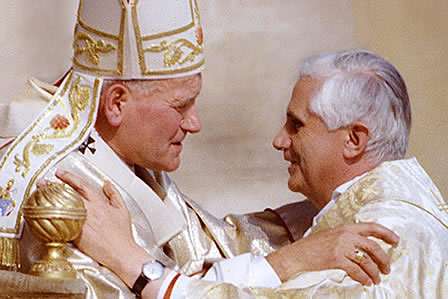What is our call?
Screen shot going up because i want to give the person credit who left the comment on Fr Z’s blog:
Here is the text of the comment:
“Among those “true particular Churches” which have been the subject of considerable discussion here, one Hierarch in the apostolic succession may act toward another as Pope St. Victor did toward the Bishops of the Churches of Asia. Is something like that possible between (for example) one diocesan bishop and another – or must any such instance be referred to the Pope?”
This is a good question, and cuts to the root of the problem. What are we called to believe at our confirmation? Are we called to defend the Church? Absolutely. Are we called to defend Christ? Absolutely. Are we called to defend the weak, and the poor, and the helpless? Absolutely. But that is not all. We are also called to defend the Pope as the Vicar of Christ. Insofar as I can see, as soon as we make that step – that decision to come into the fullness of the Church – we have promises to keep to Christ, and his church and the Pope. This includes obedience to the office. Even in the face of sin. In a sense, look at it this way. All Popes sin to a certain degree. If the efficacy of the sacraments were dependent upon the character of the Pope – would it differ if the pope were Alexander IV, or for that matter, our beloved Benedict? No. For a little bit of yeast leavens the whole dough. We cannot divide our human nature from sin. Therefore, one comes to the conclusion that all popes are thus tainted and unworthy of obedience, because they cannot keep themselves from sinning even a little bit, and ultimately the degree does not matter.
What does matter is the office. In the same way as ordination works, so does the Papacy. The office is protected by Christ himself just as the doctrine of the church, and just as the rest of the magisterium is preserved. There is a distinction between the office of the papacy and the man itself. For – would Alexander in the person sit on the papal throne, he could no more tarnish the thrones in his multitude of sins than our beloved Benedict.
“How might, or ought, anyone ‘equal or lower in the Hierarchy’ (etc.) act lovingly as St. Irenaeus did, for his own spiritual well-being and that of others, not least a grievously erring or grossly sinning Hierarch?”
Through obedience. Recall that when Israel sinned, and Elijah fled to Sinai, that he pled with God that he was the only priest of God. God’s first question to Elijah, “why are you here, Elijah?” In essence – God had not summoned him, so Elijah, in devotion to God – had no need to be there at that point in time. After Elijah explained his predictament, what does God say to him? “I have preserved 500 who’s lips have not kissed the feet of Baal”. That is how we must respond, should such an eventuality arise. Keep the faith, and remain in obedience to her and the office.




No comments:
Post a Comment